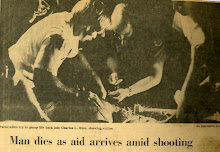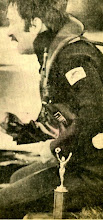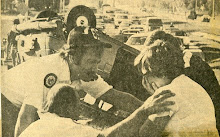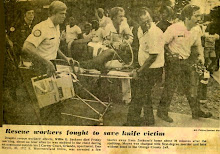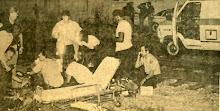A doctor once told me that 40% of the patients I would see in EMS would die no matter what I did, another 40% of the patients would live no matter what I did, but there would be 20% where what I did would make a difference. He told me to hold on to that 20% because it was all you were going to get and it would have to be enough.
Tuesday, September 29, 2009
Monday, September 28, 2009
What Separates Us
A fire station is a unique environment. It is connected to the nervous system of the community it serves. A nervous system that finds every trash fire, car fire, house fire, woman not breathing, child hit my a car, accident with injuries, shooting, stabbing, overdose, difficulty breathing, drowning, cardiac, asthma attack and every other type of personal disaster imaginable. It exists outside the bubble of safety that it helps create for everyone else. When we walk into the station we become part of the nervous system. We become part of all the bad things that happen in our community. We gain knowledge that few outside the station understand exists.
Even if it is not your call, there is this constant litany of emergencies over the radio as other units are dispatched. We stand in the open bay doors and watch children play and ride their bikes in front of the station, while you are listening to units at a shooting on the west side of town. Or you are having breakfast as Engine 6 and Rescue 6 have a woman not breathing. You are cleaning the truck as Engine 2 and Rescue 2 have a stabbing. Then your tones go off and you have your own emergency to manage.
Civilians are the people who live that bubble. That sphere of safety created by us in stations across the city. The bubble where they went to work, ate, slept and played and nobody got hurt or died. Where they felt safe and secure knowing that help is only a phone call away no matter what the emergency. Where they could walk around and not worry about anything except what their own self interest, because when that bubble burst they knew that with a simple phone call we would come and fix whatever was wrong. Our job was to create the bubble and when it burst it was up to us to try to put it back together.
So while we sit in the station in the midst of all of the peace and quite of the neighborhood around us, we are part of this nervous system. We are no longer part of the peaceful world. We are part of the nervous system that can jerk us into the midst of any emergency imaginable. Our job is to create a perceived bubble of safety for our community that protects it no matter what happens. No matter how bad the situation we respond and try and put the pieces back together so people can feel safe again. Can feel protected again. Our job is to try to keep the bubble intact.
When we go to work somebody usually dies, maybe not in fire but in small ways like the auto accident, the drowning, the cardiac, the shooting, the stabbing, or just the end of living a good long life. But somebody died, we live in a world where the unthinkable can and does happen, a world where people die sudden and sometimes ugly deaths. They all had lives and they were over now. Where things are not nice and neat. Where life seems to leave a lot of loose ends. Loose ends that most people only deal with once or twice in a lifetime if they are lucky. These small personal tragedies are our job.
So we enter the real world where actions had terrible consequences. We live with a profound truth that had been lost in our modern society, that death is very near to all of us and it doesn’t take much to cross that line. The great “they” have forgotten it. Modern society seems to try and convince everyone that death is somehow this unusual event. This news-making story of horror. Death is in all our futures in one-way or another. No amount of exercise, diet, drugs or laws will change that ending. Yet in today’s society everyone is so shocked when death does come close.
The nightly news anchors always frown and show concern when they report one of our incidents before moving on to the next story. Secure in the knowledge something so terrible could not happen to them, because they occupy the most protected part of sphere that money, fame and privilege provides. But when it happens to one of them watch their faces. Everything is more real to them. Suddenly it could happen to them and people they know it. But those of us who climb onto the trucks, we have the knowledge. We know how close it is. We think we are smart enough, tough enough and lucky enough to dodge the chances we take on the job long enough to die peacefully in bed.
Because we take that knowledge away from the station, we live with it everyday, it is ground into us. We see life through this new prism. When we walk down the street, go to the beach, go out to eat, we see things that others don’t. We walk in the sphere with the others, but we are always looking for the cracks or leaks that if you are not careful, could make you an accident victim.
We feel separate and apart from those without the knowledge. It is why we spend so many of our off hours with one another. No one else understands. When we tell a story the other guys laugh when they should and shake their heads when they should. It can put up a permanent wall if you let it. This reality pushes you from other people. Friends ask “What happened lately? Do you have any good stories?” But to us, these people are not just stories. They are people who bleed. Who cry. Who die. So you answer “Ah, nothing much happened.” Because when we tell a story if it is for the vicarious thrill of somebody, it diminishes the pain of the victim and our efforts.
What we did is not a story. What we did was a desperate attempt to beat back the inevitable in many cases. But it is our job to try. Certain events stuck in our mind the way signposts draw you attention on the Interstate. They are turning points. Point of reference. Many times they are turning points in our own lives. What we did. What we saw. What we heard. What we tried to do. How we tried to help sometimes can fundamentally change who we are, and how we view the world. And yet none of these events make the headlines. They are the little articles on page two in the local section of the paper, but we carry it around with us each day for the rest of our lives. It separates us from those around us who don't have the knowledge who don't understand. It is the reason that even after thirty years when I see someone I served with we shake hands, smile and ask how they are doing, but there is always a moment that we exchange a glance, a recognition of someone else who knows, who understands, who has the knowledge. The knowing makes us part of a brotherhood. A brotherhood that separates us from those around us and places us the outside the bubble we created.
Sunday, May 25, 2008
Suicides are Not Painless
Suicides are painless. That line from the MASH TV show theme ran through my head the other day and I thought of the man with no face. Suicides are not painless. In fact they inflect more long lasting pain than they relieve. I discovered this the night a man put a shotgun under his chin and pulled the trigger. I had been to many attempts and successes over the years but this is the one that stands out above the others.
The only furniture in the apartment was a single chair. There was no TV, no table, nothing but this single chair in the apartment. The man had placed the chair in the center of the room and put the shotgun under his chin and pulled the trigger. When we arrived we found him still sitting up right appearing normal for all intents and purposes except he had no face. It looked as if someone had taken an ice cream scoop and scooped out his face leaving behind dried blood, broken bone and torn tissue. He had left no note or explanation for this last act. A faceless man sitting in a chair in the middle of an empty room, with not explanations, it had to be some kind of reflection of the life he had led, of the things he had done or had been done to him that led him to this end.
There was nothing for us to do but call him and wait for the cops. We loaded the gear back on the truck and waited. The cops, not wanting to do the paper work, were avoiding the call so we had to sit there with the person who had found the body and called. It was his son. He sat on the curb saying nothing for sometime. We stood around trying to give him some space. He finally began to talk maybe not to us as much as to himself.
He kept asking why but did not have any answers that gave him any peace. The pain of his loss was palpable. But the burden that he was going to have to carry was what struck me. The image of that single chair and the faceless man sitting in an empty room with the ceiling covered in gore would be etched in his mind for the rest of his life. With no note he could only guess why someone would do such a thing. It was as if he had done it to his son as well as to himself. He must have known it would be his son who would find him. It seemed such a cruel act to others more than relief for his pain.
I had seen how suicides were treated in the ER’s over the years. The doctors and nurses treated them derision and medical treatment that bordered on cruelty. When I would bring overdose that attempted suicide to particular one doctor he would always smile and order the largest NG tube he could, the “garden hose” as he would say. I never understood their feelings until that night, when I saw the impact it has on those around them. I never saw terminally ill patients who had real choices to make just people acting out, crying for help. I would always talk to them and try and “help” them during the time I saw them.
As I sat there with the son letting him talk I began to feel the real pain a suicide inflicts on those around them. It was going to change the son’s life in so many ways. It would change everyone’s life connected to him. It would add to the burdens in their own lives. The man suicide was so much like dropping a stone in a pond but the ripples were those close to him pain. Those ripples would be felt for the rest of their lives. The cops came, we loaded on the truck and left the scene. But that the guy with no face and his son on the curb never really left me.
After the man with no face I changed. I saw those attempted who suicide the same way that the doctors and nurses did. As an act that inflects much more pain that it ever relieves. I was abrupt and unsympathetic with attempted suicides. I made sure I followed standing orders to the letter and got them to the hospital as soon as possible. In my ways I think I provided better care than before. They got to the hospital quicker and got the help the really needed a psychiatrist or psychologist. I don't know if I was right or wrong in my approach, all I know it is the way I did it. As with most challenges on the street in the early days this one came with no handbook. So each of us was left to work our way through them on our own.
Sunday, May 4, 2008
Nursing Home Nightmares
We received a call to one of the local nursing homes. Orlando seems to have more than its share and I always hated calls to them. The level of care and the quality of care was almost universally less than it should have been. We were always faced with difficult and complex problems that rarely fit into any set of standing orders. Like the patient who had been seizing for an hour before they finally decided they should call us. Or the patient who had not had a bowl movement in a week and the staff had waited until the patient stomach was so distended it was causing them to have difficulty breathing and only then to call us. It had come in as a difficulty breathing. Yeah a little O2 was going to fix that one.
